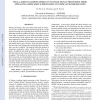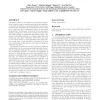362 search results - page 5 / 73 » Making the Most of Cache Groups |
ICASSP
2009
IEEE
14 years 4 months ago
2009
IEEE
Whereas lecturing is the most widely used mode of instruction, we have explored small-group learning projects to make signal processing more appealing at the University and in Eng...
CF
2006
ACM
13 years 11 months ago
2006
ACM
The growing speed gap between memory and processor makes an efficient use of the cache ever more important to reach high performance. One of the most important ways to improve cac...
AAECC
2007
Springer
13 years 10 months ago
2007
Springer
Abstract. We present new performance models and a new, more compact data structure for cache blocking when applied to the sparse matrixvector multiply (SpM×V) operation, y ← y +...
HIPEAC
2007
Springer
14 years 4 months ago
2007
Springer
Caches are designed to provide the best tradeoff between access speed and capacity for a set of target applications. Unfortunately, different applications, and even different phas...
EMSOFT
2009
Springer
14 years 4 months ago
2009
Springer
The major obstacle to use multicores for real-time applications is that we may not predict and provide any guarantee on real-time properties of embedded software on such platforms...


